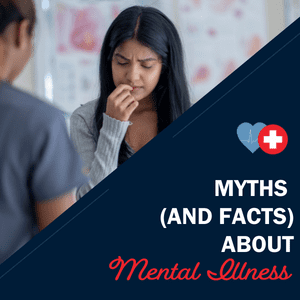Myths (and Facts) About Mental Illness and Disease
 Every year, people are coming forward with their stories of living life with a mental illness without being shamed. Sadly, there are still a few myths that have lingered for a long time about mental health problems. These myths are further discriminating people with mental health and it’s time to shine a light on the facts.
Every year, people are coming forward with their stories of living life with a mental illness without being shamed. Sadly, there are still a few myths that have lingered for a long time about mental health problems. These myths are further discriminating people with mental health and it’s time to shine a light on the facts.
All facts are sourced from MentalHealth.gov and the National Alliance on Mental Illness.
MYTH: Mental health problems only affect people who are “crazy”, not “normal” people.
Fact: While many movies and TV shows portray people with mental illness and in a negative way, millions of average, everyday people in the United States suffer from various mental health problems.
- On average, one in five Americans will experience some form of mental health issue over the course of a year.
- On average, one in 25 Americans live with a serious mental illness, such as schizophrenia or bipolar disorder.
The sooner we accept mental health issues to be commonplace, the sooner we can more effectively help people towards recovery.
MYTH: Mental health issues can be fixed if someone tries hard enough. They simply lack the willpower.
Fact: Most mental health illnesses and diseases are caused by many external factors outside a person’s control, such as:
- Genes or brain chemistry.
- Life experiences, such as trauma or abuse.
- Family history of mental health problems.
Telling someone to “Get over it” or try harder only leads to more discrimination and problems for that person down the road. For anyone with mental health issues that feel overwhelming and out of their control, recovery is possible.
MYTH: One person can’t do anything for a friend with a mental health problem.
Fact: Friends, family, and other loved ones can play a huge role in the recovery of someone with a mental health illness. Many therapists consider a support system to be a key component in any recovery.
- Reach out and let that person know you are available to help and talk.
- Learn and share the facts (like these) about mental health so the person does not go down the wrong path.
- People with mental health problems are the same as anyone else; treat them with respect, same as you would anyone else.
MYTH: Psychiatric medications will change you as a person and should not be taken.
Fact: Many people see psychiatric medication as an “easy way out” without tackling the root cause of their mental health issues. This is a dangerous idea because medications can be an incredibly powerful tool on the road to recovery. Here are some things to keep in mind:
- Mental illness is still an illness. Just like giving medication for a strep throat, medication can help deal with mental illnesses.
- Medication for people with certain mental illnesses are needed just to survive day-to-day. Anxiety, ADHD, and moderate depression are all examples of illnesses that have symptoms that can be eased with medication.
- Many times, medication is combined with therapy to greatly improve someone’s chances of recovery.
People with mental disease should not be seen as violent or “crazy” for having an illness that is beyond their control. By reading these facts, you have already taken the first step in stopping the stigma of mental illness.




